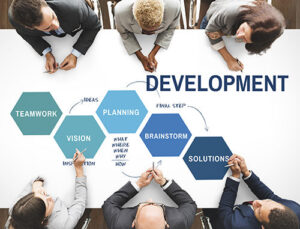
In the fast world of business, “business development” and “sales” are often used interchangeably. While they’re closely related and are essential to revenue growth. Understanding the distinction between the two can significantly enhance your strategy, team structure, and overall success.
What Is Business Development?
Business development (BD) is the process of identifying long-term value opportunities through markets, customers, and partnerships. It’s about laying the groundwork for growth by building relationships, spotting trends, and opening doors to new opportunities.
Key Functions of Business Development:
-
Market research and analysis.
-
Identifying potential partners or clients.
-
Creating growth plans.
-
Networking &relationship-building.
-
Brand positioning & expansion planning.
What Is Sales?
Sales is focused on converting leads into paying customers. It’s the execution phase where strategies turn into revenue. Sales professionals work directly with prospects to understand their needs, present solutions, and close deals.
Key Functions of Sales:
-
Lead qualification.
-
Product or service presentations.
-
Negotiations and closing deals.
-
Customer relationship management.
-
Meeting short-term revenue targets.
The Key Differences
| Aspect | Business Development | Sales |
|---|---|---|
| Focus | Long-term growth and opportunities | Short-term revenue and closing deals |
| Goals | Building partnerships, opening markets | Converting leads into customers |
| Approach | Strategic, research-based, relationship-driven | Tactical, customer-focused, results-oriented |
| Timeline | Medium to long-term | Immediate to short-term |
| Metrics | Pipeline growth, partnerships, market expansion | Sales quota, revenue generated, deal closures |
Why the Difference Matters
1. Clear Role Definitions Improve Efficiency
When team members know their responsibilities—whether it’s sourcing opportunities or closing deals—they can focus their efforts and excel in their areas.
2. Better Hiring Decisions
BD professionals often need strong networking and strategic thinking skills, while salespeople must be persuasive, persistent, and goal-oriented.
3. Balanced Growth Strategy
A strong BD strategy fills the pipeline with quality leads and opportunities. A skilled sales team turns those opportunities into revenue. Together, they create a seamless growth engine.
The Ideal Collaboration
Business development and sales shouldn’t operate in silos. Instead, they should work in tandem:
-
BD identifies and warms up leads → Sales nurtures and closes them.
-
BD explores new markets → Sales tests the viability with real-world data.
-
BD builds strategic alliances → Sales leverages them to upsell or cross-sell.
Conclusion
Business development and sales are two sides of the same coin. While business development focuses on opportunity creation, sales is about opportunity conversion. Understanding their differences helps companies design more effective strategies, align teams, and drive sustainable success.
Copyright © 2025 Archana Jojith.All rights reserved.






